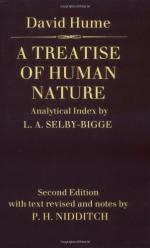
|
| Name: _________________________ | Period: ___________________ |
This test consists of 5 multiple choice questions, 5 short answer questions, and 10 short essay questions.
Multiple Choice Questions
1. For what does Hume think people mistake their perceptions?
(a) Reality.
(b) Love.
(c) Feeliing.
(d) Friendship.
2. What is the name of the system used to prove the existence of God?
(a) Christian science.
(b) Theology.
(c) Metaphysics.
(d) Astrology.
3. How does Hume define responsive passions?
(a) As those that react to the external world.
(b) As those that react to sympathy.
(c) As those that react to productive passions.
(d) As those that react to feelings of love.
4. Which of the following passions does Hume call a bodily feeling?
(a) Love.
(b) Pleasure.
(c) Rage.
(d) Pride.
5. From where does Hume say facts come?
(a) The imagination.
(b) The government.
(c) Experience.
(d) History.
Short Answer Questions
1. Hume says complex ideas are divided into what?
2. Hume says everyone can feel the difference between what?
3. What does Hume say will is instead of a power?
4. Which of the following is unreliable in terms of perceiving things?
5. What does Hume say is limited?
Short Essay Questions
1. How does Hume claim the mind perceives space?
2. How does Hume divide the different kinds of philosophical relations?
3. Why does Hume reject the idea of an immaterial soul?
4. Why does Hume think we love the rich and admire only people we know?
5. Why does Hume think it is pointless to wonder about the external world?
6. In which two senses is the word relation commonly used?
7. Why can only our imagination produce belief in external objects?
8. What does Hume say are simple perceptions?
9. What are Dr. Clarke's views on cause and effect?
10. Define skepticism.
|
This section contains 767 words (approx. 3 pages at 300 words per page) |

|




